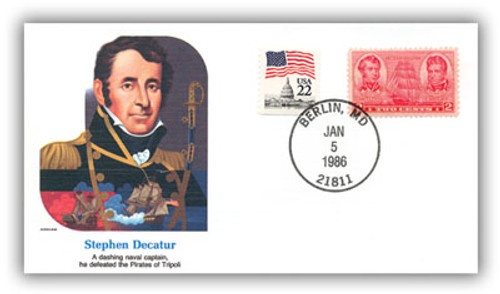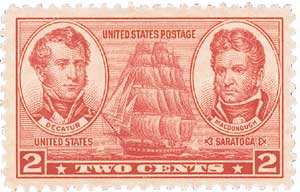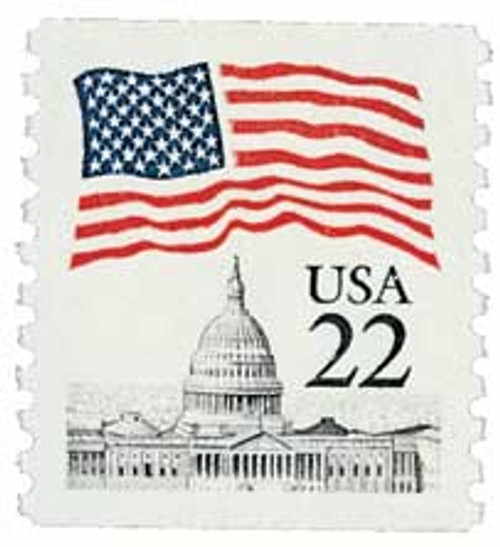
# 20073 - 1986 Stephen Decatur Commemorative Cover
Death Of Stephen Decatur
Stephen Decatur, Jr., was born on January 5, 1779, in Sinepuxent, Maryland. His family had fled their home in Philadelphia months before he was born because of the British occupation, but were able to return shortly after. When he developed a severe case of whooping cough, Decatur was sent on a merchant voyage to Europe with his father, as the salty sea air was considered the cure. He returned home not only completely cured of the cough, but also determined to become a sailor.
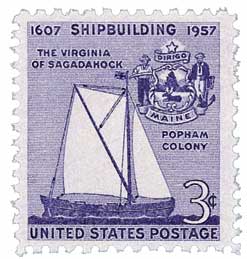
Decatur’s parents had other plans however, and wanted him to become a clergyman. But after several years of schooling that didn’t appeal to him, Decatur dropped out to follow his dream. With his father’s help, Decatur took a position with a shipbuilding firm and supervised the construction of the frigate United States. He was then commissioned a midshipman in the Navy and began his service aboard the United States.
Decatur served on the United States and the Norfolk during the Quasi War with France. He participated in several missions patrolling the South Atlantic coast to protect American merchant ships.
In 1801, America entered a new conflict – the First Barbary War – against pirates from the Barbary States that had been attacking American ships in the Mediterranean. Decatur served on commanded several ships during this conflict, fighting against and capturing a number of enemy vessels. It was also during this war that Decatur orchestrated the burning of the Philadelphia, to prevent its use by enemy forces. He went on to aid in the attack on Tripoli, capturing three enemy boats and sinking three others. Decatur also took part in hand-to-hand fighting aboard an enemy ship.
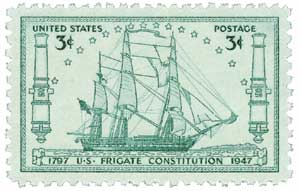
For his daring efforts during this conflict, 25-year-old Decatur was made the navy’s youngest captain and briefly given command of the USS Constitution. Upon returning to America Decatur got married and oversaw the construction of four new gunboats. He then commanded the USS Chesapeake and later the United States on patrols of the east coast to enforce the Embargo Act.
During the War of 1812, Decatur captured the British vessel HMS Macedonian. Then in January 1815, he led a daring attempt at breaking through the British blockade. While he initially managed to break through, the ensuing British attack inflicted dozens of casualties, including Decatur, forcing him to surrender. When he boarded the British ship to surrender, Decatur handed the captain his sword, but it was immediately returned as the captain claimed he was “proud in returning the sword of an officer who had defended his ship so nobly.” Decatur was then taken prisoner for a few weeks until they received word that the war had ended. After returning home he received a Congressional Gold Medal.
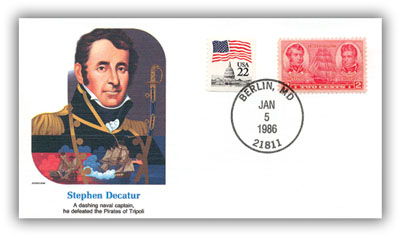
Months later, Decatur was dispatched back to the Mediterranean for the Second Barbary War. That June, he captured the flagship of the Algerian fleet, leading them to quickly sign a treaty. Decatur then moved on to Tunis and Tripoli where all his demands were met. He then sailed home a hero and became known as “the Conqueror of the Barbary Pirates.” Upon his return, Decatur was selected to serve on the Board of Navy Commissioners, remaining in that role from 1816 to 1820.
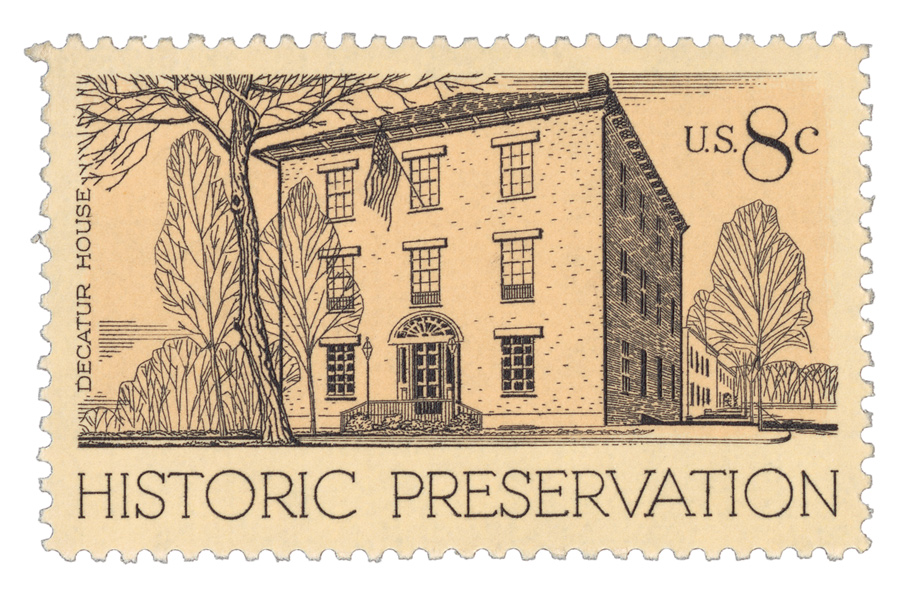
Years earlier, in 1807, Decatur took part in the court martial of his former commander Commodore James Barron. Barron had surrendered his ship in the Chesapeake-Leopard Affair after only firing a single shot. Barron was barred from service for five years and left the country. When Barron came back seeking reinstatement, Decatur spoke out against him. Barron then challenged Decatur to a duel, which was so common at the time, the War Department had to issue threats of discharge against those who participated. However, Decatur agreed and brought William Bainbridge as his second.
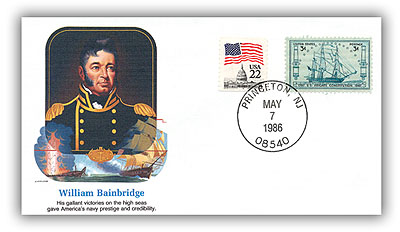
The duel was set for 9:00 a.m. on March 22, in Bladensburg, Maryland. Rather than standing back-to-back and pacing away from each other, the men stood face-to-face, and understood the likelihood that they would both be hurt. Both men fired before the count of “two,” and both were struck. While Barron would recover from his wounds, Decatur wouldn’t. However, Barron quickly forgave Decatur for his actions. Decatur died about 10:30 that night from his wounds. Many were shocked to hear of his death, and even more so that it was at the hands of a fellow naval officer. About 10,000 people including President James Monroe attended his funeral.
Death Of Stephen Decatur
Stephen Decatur, Jr., was born on January 5, 1779, in Sinepuxent, Maryland. His family had fled their home in Philadelphia months before he was born because of the British occupation, but were able to return shortly after. When he developed a severe case of whooping cough, Decatur was sent on a merchant voyage to Europe with his father, as the salty sea air was considered the cure. He returned home not only completely cured of the cough, but also determined to become a sailor.

Decatur’s parents had other plans however, and wanted him to become a clergyman. But after several years of schooling that didn’t appeal to him, Decatur dropped out to follow his dream. With his father’s help, Decatur took a position with a shipbuilding firm and supervised the construction of the frigate United States. He was then commissioned a midshipman in the Navy and began his service aboard the United States.
Decatur served on the United States and the Norfolk during the Quasi War with France. He participated in several missions patrolling the South Atlantic coast to protect American merchant ships.
In 1801, America entered a new conflict – the First Barbary War – against pirates from the Barbary States that had been attacking American ships in the Mediterranean. Decatur served on commanded several ships during this conflict, fighting against and capturing a number of enemy vessels. It was also during this war that Decatur orchestrated the burning of the Philadelphia, to prevent its use by enemy forces. He went on to aid in the attack on Tripoli, capturing three enemy boats and sinking three others. Decatur also took part in hand-to-hand fighting aboard an enemy ship.

For his daring efforts during this conflict, 25-year-old Decatur was made the navy’s youngest captain and briefly given command of the USS Constitution. Upon returning to America Decatur got married and oversaw the construction of four new gunboats. He then commanded the USS Chesapeake and later the United States on patrols of the east coast to enforce the Embargo Act.
During the War of 1812, Decatur captured the British vessel HMS Macedonian. Then in January 1815, he led a daring attempt at breaking through the British blockade. While he initially managed to break through, the ensuing British attack inflicted dozens of casualties, including Decatur, forcing him to surrender. When he boarded the British ship to surrender, Decatur handed the captain his sword, but it was immediately returned as the captain claimed he was “proud in returning the sword of an officer who had defended his ship so nobly.” Decatur was then taken prisoner for a few weeks until they received word that the war had ended. After returning home he received a Congressional Gold Medal.

Months later, Decatur was dispatched back to the Mediterranean for the Second Barbary War. That June, he captured the flagship of the Algerian fleet, leading them to quickly sign a treaty. Decatur then moved on to Tunis and Tripoli where all his demands were met. He then sailed home a hero and became known as “the Conqueror of the Barbary Pirates.” Upon his return, Decatur was selected to serve on the Board of Navy Commissioners, remaining in that role from 1816 to 1820.

Years earlier, in 1807, Decatur took part in the court martial of his former commander Commodore James Barron. Barron had surrendered his ship in the Chesapeake-Leopard Affair after only firing a single shot. Barron was barred from service for five years and left the country. When Barron came back seeking reinstatement, Decatur spoke out against him. Barron then challenged Decatur to a duel, which was so common at the time, the War Department had to issue threats of discharge against those who participated. However, Decatur agreed and brought William Bainbridge as his second.

The duel was set for 9:00 a.m. on March 22, in Bladensburg, Maryland. Rather than standing back-to-back and pacing away from each other, the men stood face-to-face, and understood the likelihood that they would both be hurt. Both men fired before the count of “two,” and both were struck. While Barron would recover from his wounds, Decatur wouldn’t. However, Barron quickly forgave Decatur for his actions. Decatur died about 10:30 that night from his wounds. Many were shocked to hear of his death, and even more so that it was at the hands of a fellow naval officer. About 10,000 people including President James Monroe attended his funeral.

